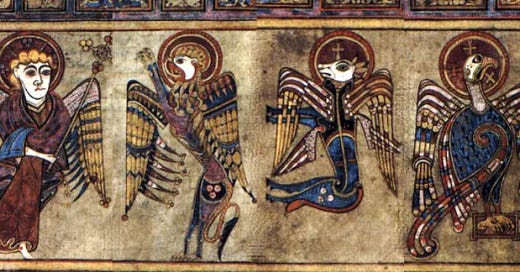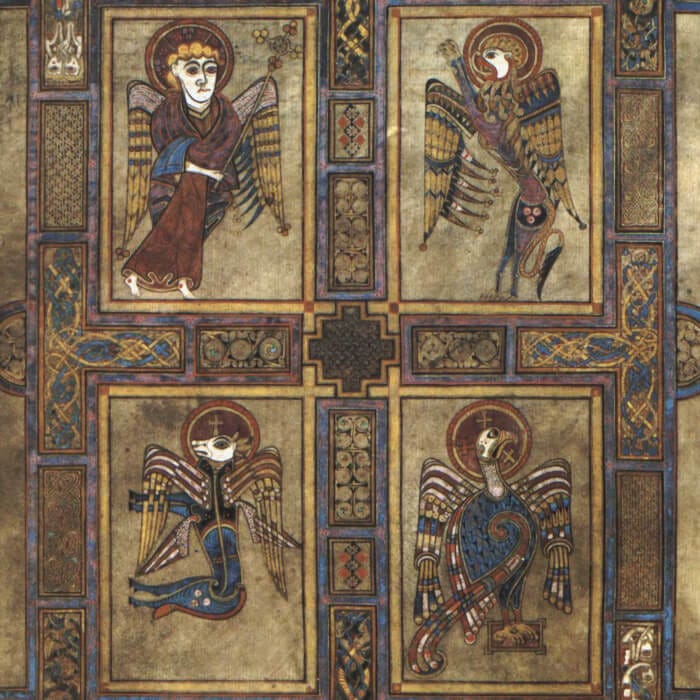In today’s first reading, we get an image of a tetramorph—four symbols pushed together.
This probably looks familiar, because we often see these images around the church.
The lion, calf (or ox), human, and eagle symbolize, respectively, what is noblest, strongest, wisest, and swiftest in creation. Since at least the second century, these four creatures have been used as symbols of the evangelists Mark, Luke, Matthew, and John, also respectively.
I always found it weird that Matthew is symbolized by just… a guy, but here we are.
Reading 1
Rv 4:1-11
I, John, had a vision of an open door to heaven, and I heard the trumpetlike voice that had spoken to me before, saying, “Come up here and I will show you what must happen afterwards.”
At once I was caught up in spirit. A throne was there in heaven, and on the throne sat one whose appearance sparkled like jasper and carnelian. Around the throne was a halo as brilliant as an emerald. Surrounding the throne I saw twenty-four other thrones on which twenty-four elders sat, dressed in white garments and with gold crowns on their heads. From the throne came flashes of lightning, rumblings, and peals of thunder. Seven flaming torches burned in front of the throne, which are the seven spirits of God. In front of the throne was something that resembled a sea of glass like crystal.
In the center and around the throne, there were four living creatures covered with eyes in front and in back. The first creature resembled a lion, the second was like a calf, the third had a face like that of a man, and the fourth looked like an eagle in flight. The four living creatures, each of them with six wings, were covered with eyes inside and out. Day and night they do not stop exclaiming: “Holy, holy, holy is the Lord God almighty, who was, and who is, and who is to come.”
Whenever the living creatures give glory and honor and thanks to the one who sits on the throne, who lives forever and ever, the twenty-four elders fall down before the one who sits on the throne and worship him, who lives forever and ever. They throw down their crowns before the throne, exclaiming:
“Worthy are you, Lord our God, to receive glory and honor and power, for you created all things; because of your will they came to be and were created.”
John attempts to describe angels and saints all singing to God in a complex and incomprehensible dance. There’s a lot of symbolism going on here, because it would be impossible to accurately depict Heaven in words. People have written whole books about what all of this means, but I think sometimes it’s worth just hearing1 the words and letting the vision affect you viscerally.
Responsorial Psalm
Ps 150:1b-2, 3-4, 5-6
R. (1b) Holy, holy, holy Lord, mighty God!
Praise the LORD in his sanctuary,
praise him in the firmament of his strength.
Praise him for his mighty deeds,
praise him for his sovereign majesty.
R. Holy, holy, holy Lord, mighty God!
Praise him with the blast of the trumpet,
praise him with lyre and harp,
Praise him with timbrel and dance,
praise him with strings and pipe.
R. Holy, holy, holy Lord, mighty God!
Praise him with sounding cymbals,
praise him with clanging cymbals.
Let everything that has breath
praise the LORD! Alleluia.
R. Holy, holy, holy Lord, mighty God!
This is the last psalm, and appropriately, it’s a song of praise. All prayer should include praise. But further, our lives should include praise. Everything and everyone around us has a source, and we’ll return to Him at the end of time.
Alleluia
See Jn 15:16
R. Alleluia, alleluia.
I chose you from the world,
to go and bear fruit that will last, says the Lord.
R. Alleluia, alleluia.
Remember that our faith starts with God calling us; faith is a response.
Gospel
Lk 19:11-28
While people were listening to Jesus speak, he proceeded to tell a parable because he was near Jerusalem and they thought that the Kingdom of God would appear there immediately.
So he said, "A nobleman went off to a distant country to obtain the kingship for himself and then to return. He called ten of his servants and gave them ten gold coins and told them, 'Engage in trade with these until I return.' His fellow citizens, however, despised him and sent a delegation after him to announce, 'We do not want this man to be our king.'
But when he returned after obtaining the kingship, he had the servants called, to whom he had given the money, to learn what they had gained by trading. The first came forward and said, 'Sir, your gold coin has earned ten additional ones.' He replied, 'Well done, good servant! You have been faithful in this very small matter; take charge of ten cities.'
Then the second came and reported, 'Your gold coin, sir, has earned five more.' And to this servant too he said, 'You, take charge of five cities.'
Then the other servant came and said, 'Sir, here is your gold coin; I kept it stored away in a handkerchief, for I was afraid of you, because you are a demanding man; you take up what you did not lay down and you harvest what you did not plant.'
He said to him, 'With your own words I shall condemn you, you wicked servant. You knew I was a demanding man, taking up what I did not lay down and harvesting what I did not plant; why did you not put my money in a bank? Then on my return I would have collected it with interest.'
And to those standing by he said, 'Take the gold coin from him and give it to the servant who has ten.' But they said to him, 'Sir, he has ten gold coins.'
He replied, 'I tell you, to everyone who has, more will be given, but from the one who has not, even what he has will be taken away. Now as for those enemies of mine who did not want me as their king, bring them here and slay them before me.'"
After he had said this, he proceeded on his journey up to Jerusalem.
Luke’s version of the parable of the talents adds an interesting detail not seen in Matthew—the nobleman is leaving so he can be crowned king.
The context in which Luke recounts this story, Jesus and the apostles are on their way to Jerusalem. The disciples think Jesus is about to ascend His throne!
He is, but not in the way that they think. Jesus, like the king in the parable, is going to leave them. His followers, like the servants, will have to keep faith while He’s away, despite others despising Him and rejecting His royal claim.
It’s one thing to have faith in Jesus when He’s walking around, preaching and performing miracles you can see. It’s quite another to ignore the world’s claims and keep faith that Jesus will come again.
If you weren’t aware, the Substack app can actually plays articles for you to listen to, like a podcast. It’s surprisingly good, for AI.




